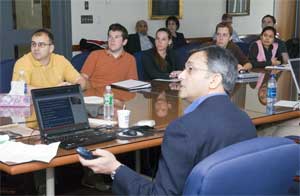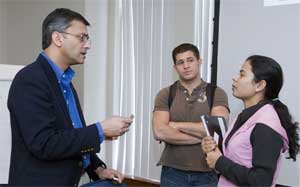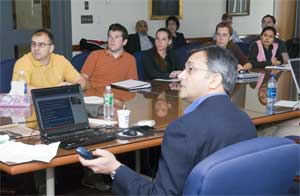 Shares his experiences from major project in South America
Shares his experiences from major project in South America
KINGSTON, R.I. – May 2, 2007 – It’s a good thing that Vik Saran works for Nike because with all of his traveling, he probably goes through plenty of shoes.
Saran, materials director of global footwear for Nike, directed the recent launch of a supply chain system in South America and accompanying manufacturing systems at 21 factory groups in Argentina, Brazil, Chile and Mexico.
Saran, who earned his master’s degree in business administration from the University of Rhode Island in 1990, visited its College of Business Administration recently to talk about his experiences with current MBA students.
“Seventeen years after finishing at URI, I ask myself, ‘how can I give back to a place that was so good to me’,” Saran said.
 Returning to the Kingston Campus and visiting with professors who guided him, as well as their current students, is one way he contributes.
Returning to the Kingston Campus and visiting with professors who guided him, as well as their current students, is one way he contributes.
He is based at Nike headquarters in Beaverton, Oregon, and is responsible for strategic planning and operations management for the footwear materials organization.
Since working as a supply chain consultant at SAP Americas, a subsidiary of SAP AG, the world’s largest business software company, he moved to the shoe industry. Before moving to Nike, he was manager of production planning, sourcing and demand planning at Reebok and worked with Stride Rite Corp. in strategic planning.
In addition to his work in South America, he has worked extensively with footwear factories in Asia.
During his remarks to the students, it was clear that he enjoys and is proud to be working at Nike.
Saran told the group that the company’s challenge is to integrate global systems in local businesses.
“In South America, we are in four countries and we need to make our global template work in local communities,” he said.
The company, which had $16 billion in revenues in 2006 compared to $6.4 billion in 1996, has had 22 consecutive quarters of growth. Nike also owns Cole Haan, Nike Bauer, Hurley clothing and Converse.
He said Nike has responded strongly to criticisms about conditions in factories that make its products.
“Nike owns no factories, but we learned we have a responsibility to the workers who make our products,” Saran said. “We didn’t get it at first, but then we learned quickly. We set new standards for our factories and now you have to maintain a minimum threshold if you want to be a Nike supplier. We are now a model around the world.”
He said the Nike philosophy is based on 10 company maxims. “One of them is to be a sponge, learn everything and absorb everything about the company and the business you are in,” said the husband and father of a 7-year-old daughter.
Pictured above
THE BUSINESS OF NIKE: Vik Saran, materials director of global footwear at Nike, chats with students in the master of business administration program at URI. From left at the table are: Greg Couturier of Swansea, Mass., Joe Looney of Chatsworth, N.J., Leah Semonelli of Middletown, Ernest Sonyi of Wayne, N.J. and Sindhu Chhabra of India and Kingston. URI News Bureau photo by Michael Salerno Photography.
OPPORTUNITIES AT NIKE: Vik Saran, materials director of Global Footwear at Nike, meets with University of Rhode Island master of business administration students Domenic Maccia of Mahopac, N.Y. and Sindhu Chhabra of India and Kingston. URI News Bureau photo by Michael Salerno Photography.

